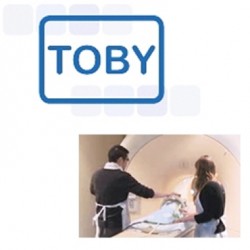By Helen Figueira
September 28, 2009
Time to read: 4 minutes
 Video Update
Video Update
Brain damage could be avoided for over 100 babies a year in the UK if infants with signs of a lack of oxygen at birth are given cooling treatment within the first 6 hours of life, according to this study, the largest of its kind.
Video Update
Brain damage could be avoided for over 100 babies a year in the UK if infants with signs of a lack of oxygen at birth are given cooling treatment within the first 6 hours of life, according to this study, the largest of its kind.
Birth asphyxia occurs when a baby’s brain and other vital organs are starved of oxygen or blood at or around time of birth. In the UK approximately 1,400 infants a year, two in every thousand full-term births, are affected. Asphyxia can be difficult to detect before a baby is born and can cause serious brain damage, severe cerebral palsy and even death in around half of the most affected cases.
Co-chief investigator Dr Denis Azzopardi of the CSC’s Neonatal Medicine group, headed by David Edwards, said: “The study builds on a 20 year body of research but gives, for the first time, irrefutable proof that cooling can be effective in reducing brain damage after birth asphyxia. Although unfortunately it doesn’t work in every case, our study showed the proportion of babies that survived without signs of brain damage went from 28% to 44% with cooling treatments – that’s a 57% increase.”
Carmel Bartley, Family Support Manager from the children’s charity Bliss said: “This is very welcome research into an area which is known to save lives. Cooling of babies with birth asphyxia is an innovative technique already being used in some neonatal centres. This is a specialist treatment that we would like to see used more widely to ensure the very best outcomes for our most vulnerable babies.”
The randomised control trial involved 325 infants affected by birth asphyxia. Half of the newborn babies had their body temperature reduced to 33-34°C (91-93F) for 72 hours followed by gradual re-warming in intensive care. Normal body temperature is around 37°C (98F).
The Total Body Hypothermia for Neonatal Encephalopathy Trial (TOBY) received almost £1million of MRC funding and involved experts from Imperial College London, Oxford University, Leeds University, Queen’s University Belfast, Nottingham University and Bristol University, as well as a large number of doctors in many hospitals across the UK and Europe.
The findings will be passed to the National Institute for Health and Clinical Excellence (NICE) who are responsible for treatment recommendations in NHS hospitals. Their interventional procedure guidance on this topic, which is currently in development, will analyse the total evidence base in this area and consider whether to recommend the use of cooling treatments in the future.
Article in New England Journal of Medicine
For further information on case studies and to arrange an interview with Dr Azzopardi and colleagues on this project, please contact Grace Money on 0207 670 5139 or .
Notes to editors
1. Moderate Hypthermia to Treat Perinatal Asphyxial Encephalopathy will be published in the New England Journal of Medicine.
2. The Total body hypothermia for neonatal encephalopathy trial (TOBY) began in 2002 but builds on research over a twenty year period.
3. The infants involved in the trial were from the UK, Hungary, Sweden Israel and Finland and were monitored for effects up 18 months of age.
4. During the summer of 2008 a consultation on the use of cooling for the treatment of perinatal asphyxia was held by NICE. NICE decided to suspend the guidance until the results of the TOBY study were available. Now that the results of TOBY are published NICE will be looking at the results alongside the total evidence base in their ongoing interventional procedure guidance on Therapeutic hypothermia with intracorporeal temperature monitoring for hypoxic perinatal brain injury, to consider whether a treatment recommendation is appropriate. www.nice.org.uk/guidance/
5. For almost 100 years the Medical Research Council has improved the health of people in the UK and around the world by supporting the highest quality science. The MRC has invested in world-class research leaders, producing 28 Nobel Prize winners and sustaining a flourishing environment for internationally recognised research. The MRC focuses on making an impact and has provided the financial muscle and scientific expertise behind medical breakthroughs including the first antibiotic penicillin, the structure of DNA and the lethal link between smoking and cancer. Today MRC funded scientists tackle research into the major health challenges of the 21st century.